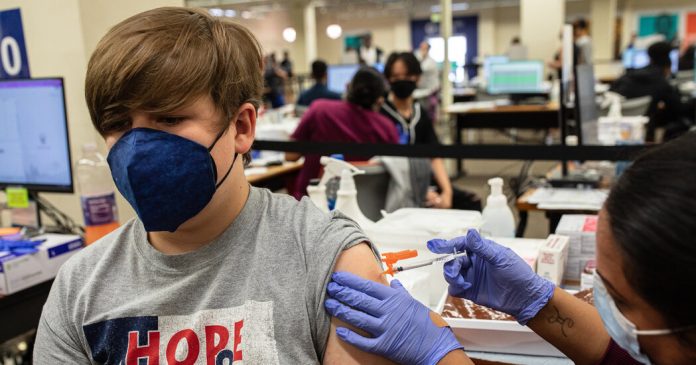5 months after immunization, two doses of the Pfizer-BioNTech vaccine appeared to supply nearly no protection towards average sickness attributable to the Omicron variant — as measured by visits to emergency departments and pressing care clinics — amongst adolescents aged 12 to 17 years, in accordance with information revealed on Tuesday by the Facilities for Illness Management and Prevention.
However booster pictures drastically elevated the safety, lending assist to the company’s suggestion of booster pictures for everybody 12 and older.
The findings should be interpreted with warning. The company’s research didn’t exclude unvaccinated adolescents who had some immunity from a previous an infection, which can have made vaccination appear much less efficient than it was.
And the researchers supplied solely restricted information on hospitalizations, a extra dependable proxy for extreme illness than emergency room and pressing care visits.
“One limitation of this information is that folks might deliver their youngsters to an pressing care or emergency division for quite a lot of causes, and vaccine effectiveness by immunocompromised standing, underlying well being standing, or vaccine product haven’t but been examined,” the C.D.C. stated in an announcement.
A number of research have proven that although vaccine efficacy towards an infection wanes over time, the immune response stays extremely protecting towards hospitalization and demise, even towards the extremely contagious Omicron variant.
A separate evaluation of knowledge from 29 jurisdictions posted on the C.D.C.’s web site reported 9 Covid-associated deaths amongst vaccinated youngsters and adolescents aged 5 to 17 between early April 2021 and January 2022, in contrast with 121 deaths in unvaccinated youngsters of these ages.
Nonetheless, the findings recommend that scientists should fastidiously monitor the vaccine’s efficiency over time in youngsters and adolescents, allowing for that boosters could also be wanted.
“We have to see extra of those research to see if that is constant,” stated Deepta Bhattacharya, an immunologist on the College of Arizona. “However I do assume it’s doubtless, and we needs to be ready as dad and mom, that it’s going to take one other shot.”
The outcomes tackle explicit import for folks as faculty districts nationwide think about ending masks mandates. The C.D.C. final week revealed new steerage suggesting that about 70 p.c of Individuals can safely drop their masks in public indoor areas.
Vaccine uptake amongst younger youngsters has been sluggish; fewer than one in 4 youngsters aged 5 to 11 at the moment are absolutely vaccinated. Greater than half of adolescents 12 to 17 have been absolutely vaccinated, with two pictures, and about 12 p.c have obtained a 3rd booster dose.
The findings observe information revealed on Monday displaying that two doses supplied little safety towards an infection with the Omicron variant in youngsters aged 5 to 11 after only one month. The vaccine has been proven to supply diminishing safety towards an infection even in adults, significantly towards the Omicron variant. New information revealed by the C.D.C. on its web site mirror this development.
Within the new research, the researchers analyzed information on 39,217 visits to emergency departments and pressing care clinics and 1,699 hospitalizations amongst youngsters aged 5 to 17 years in 10 states, from April 9, 2021, to Jan. 29, 2022.
The Coronavirus Pandemic: Key Issues to Know
A brand new U.S. technique. The White Home unveiled a virus response technique that goals for a “new regular,” however a lot of it would want congressional funding. The plan features a “take a look at to deal with” initiative that would supply antiviral drugs to sufferers as quickly as they be taught they’re contaminated.
In youngsters aged 5 to 11, the vaccine’s means to stop average sickness dropped to 46 p.c about two months after full vaccination (two weeks after the second shot). A lot of the visits to emergency rooms and pressing care clinics occurred throughout the Omicron surge, when older youngsters and adults additionally have been extra weak than they’d been earlier within the pandemic.
The vaccine’s effectiveness towards average sickness in adolescents held regular throughout the Delta period. However 150 days after full vaccination, effectiveness dropped sharply to 38 p.c in adolescents aged 12 to fifteen years, and to 46 p.c in these aged 16 and 17 years.
When the researchers analyzed information particularly for cover within the Omicron period, safety towards average sickness all however disappeared in adolescents who had been vaccinated greater than 150 days earlier. However a 3rd vaccine dose restored effectiveness to 81 p.c.
The findings are according to these from research of adults displaying that the vaccine’s effectiveness towards an infection and gentle sickness declined sharply over time, significantly after the arrival of the Omicron variant.
Effectiveness is a comparability between safety in vaccinated and unvaccinated teams of individuals. However as extra of the inhabitants positive aspects immunity by an infection, it turns into more durable to realize a real image of vaccine effectiveness, stated Paul Offit, director of the Vaccine Training Heart at Youngsters’s Hospital of Philadelphia and an adviser to the Meals and Drug Administration.
“Are we evaluating apples to apples after we say that the vaccine efficacy goes down?” he stated.
Safety towards extreme sickness was nonetheless more durable to parse. There have been too few hospitalizations within the youthful youngsters to attract agency conclusions. Amongst adolescents who had been vaccinated greater than 150 days earlier, effectiveness towards extreme sickness remained robust, at 70 p.c or larger.
However most of these hospitalizations occurred throughout the Delta period, so the info don’t present a window into the effectiveness towards hospitalization because the Omicron variant arrived and unfold.
The C.D.C. recommends booster pictures for Individuals aged 12 and older. Pfizer and BioNTech are evaluating the good thing about a 3rd dose in youthful youngsters.


